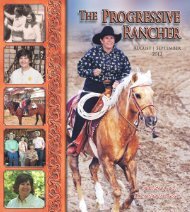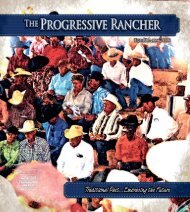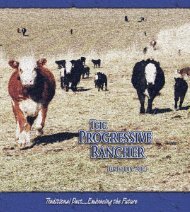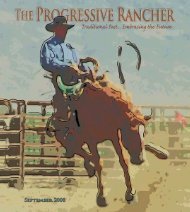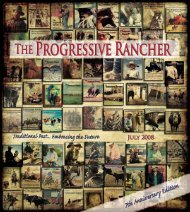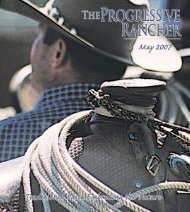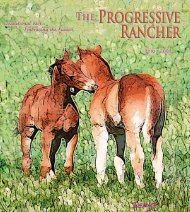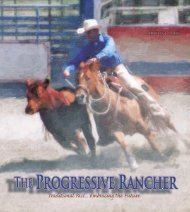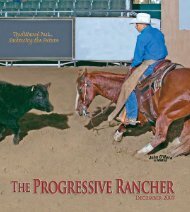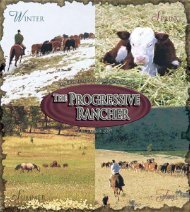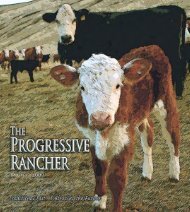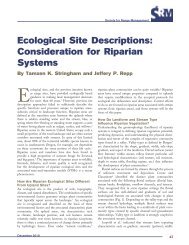fallon Bull Sale - The Progressive Rancher Magazine
fallon Bull Sale - The Progressive Rancher Magazine
fallon Bull Sale - The Progressive Rancher Magazine
Create successful ePaper yourself
Turn your PDF publications into a flip-book with our unique Google optimized e-Paper software.
Hereditary Equine Regional Dermis Asthenia<br />
Herda, hereditary equine regional dermis asthenia, is a genetic disorder in horses that<br />
cause the skin on a horse’s back to separate, lift off, and even tear away when the horse<br />
suffers a skin trauma. In affected horses, there is a lack of adhesion within the deep layers<br />
of the skin; witch attaches the skin to the horse. It is believed HERDA is due to a collagen<br />
defect resulting in fragile attachment of the skin. Even light contact with the horses<br />
back, neck, hips, and sometimes lower legs of an affected horse can cause it to separate<br />
and peel off, resulting in a gaping wound that exposes the muscle underneath. One of the<br />
most frustrating elements of this disease is affected horses rarely show symptoms prior<br />
to their yearling year and often times as late as two or three years of age. <strong>The</strong>refore often<br />
owners have a lot of money and time invested in the horse before knowing it is affected.<br />
Herda is a disease for which there is no known cure or treatment, most all cases result in<br />
euthanasia. So the question becomes, what do we do as responsible breeders to stop the<br />
spread of Herda?<br />
I believe knowledge is the key to slowing the spread of this disorder. Some breeders<br />
have made the decision to simply not breed to any carrier horses. This does however limit<br />
your choices as a breeder; some believe it may also be a disservice to the bred. Image if<br />
Poco Buena or Doc O’lena, (95% of affected horses trace back to Poco Bueno on both sides<br />
of the pedigree) were never produced; where the working quarter horse breed would be<br />
today. It really is hard to imagine, they are the back bone of a high percentage of the black<br />
type horses we know today.<br />
To make educated breeding decisions it is import to understand that Herda is thought<br />
to be caused by an autosomal recessive gene, meaning that both the sire and the dam must<br />
posses the gene in order for the offspring to be affected. This also means that horses that<br />
have the gene can be carriers without being affected. As long as a carrier is bred to a Herda<br />
Free individual, the offspring can not develop the disease. <strong>The</strong> problem arises when two<br />
carriers of the gene mate. Breeding a carrier to a carrier will result in a 25% chance of<br />
producing an affected foal, a 50% chance of producing a carrier, and a 25% chance of producing<br />
a genetically normal foal. However, it is important to keep in mind that breeding a<br />
carrier stallion or mare to a normal gened mare or stallion can result in 50% of the offspring<br />
being a herda gene carrier. <strong>The</strong> other 50% would be genetically normal.<br />
<strong>The</strong> great news is a diagnostic DNA hair sample test for Herda has been developed.<br />
It allows identification of not only affected horses, but also carriers. Results show either,<br />
normal, carrier, or affected.<br />
N/N-Normal: does not have the herda gene<br />
N/HRD-Carrier: carries one copy of the gene<br />
HRD/HRD-Affected: has two copies of the gene<br />
For horse breeders, identification of carriers is critical for the selection of mating pairs.<br />
I feel that responsible breeders should be willing to run DNA test on their stock, and they<br />
should make responsible breeding decisions based on the results. This is true whether you<br />
are standing a stallion or a mare owner. Know the status of your stock, and also know the<br />
status of the mares or stallion you are choosing to breed. Currently managed breeding<br />
strategy is the only option for reducing the incidence of this poorly understood disease.<br />
Testing is available through the Veterinary Genetics Laboratory at UC Davis. You can<br />
also call our office for testing information or any other questions. Outback Stallion Station,<br />
Caldwell, Idaho 208-454-5557.<br />
F i n a n c i a l Focus<br />
Presented by Sonny Davidson, Financial Advisor, Edward Jones in Elko, Nevada<br />
2213 North 5th Street, Suite A | 775-738-8811<br />
Put Your Financial “Puzzle” Pieces Together<br />
Unless you keep track of obscure holidays, you may not be aware that January 29 is<br />
National Puzzle Day. And while this day may not draw much attention, it does recognize<br />
the enjoyment that millions of people get from doing puzzles. Of course, you’ll find puzzles<br />
in all aspects of your life. Consider, for example, the type of retirement lifestyle you’ve<br />
envisioned: travel, volunteering, pursuing hobbies, and perhaps even opening your own<br />
business. To make this picture come to life, you need to put the financial “pieces” together:<br />
And one way to help accomplish this is to consolidate your various retirement accounts<br />
— such as your IRA, 401(k) and other employer-sponsored retirement plans — with one<br />
financial services provider.<br />
When you consolidate these types of accounts, you can gain a number of key benefits,<br />
including these:<br />
• Potential reduction of fees and paperwork — By working with just one provider, you<br />
may be able to save on the fees and paperwork required to maintain your account.<br />
• Easier management of distributions — Most retirement plans, including a 401(k),<br />
457(b), 403(b) and a traditional IRA, require you to start taking minimum distributions<br />
once you turn 70 -1/2. (<strong>The</strong>se distributions are not required for Roth IRAs.) While it’s not<br />
terribly complicated to determine a single distribution, it can be cumbersome and confusing<br />
to calculate multiple distributions from multiple providers. Having all your RMDs<br />
coming from a single provider can greatly streamline the process.<br />
• Easier calculation of taxes — Most types of retirement accounts are tax-deferred<br />
— but on those accounts, taxes will be due on your withdrawals. By consolidating your<br />
accounts, your distributions will be easier to track, as mentioned above, which may make<br />
it easier for you to calculate the taxes due.<br />
• Unified investment strategy — If you place all your financial assets with one financial-services<br />
provider, you’ll find it much easier to follow a single, unified investment strategy.<br />
A local, qualified financial advisor can help you allocate your investment dollars in a<br />
way that’s appropriate for your retirement goals, risk tolerance and time horizon.<br />
To start the consolidation process, make a detailed list of your financial assets, such as<br />
your bank accounts, investments, IRAs and employer-sponsored retirement plans, such as<br />
a 401(k), if you worked for a private employer, a 457(b), if you worked for a state or local<br />
government, or a 403(b), if you worked for a school or other tax-exempt organization. You<br />
might think this is a simple and straightforward task, but you would be surprised at how<br />
many people actually lose track of these types of accounts, and, as a result, may forfeit the<br />
money that is rightfully theirs.<br />
After you’ve identified what assets you have, and where they’re located, seek to consolidate<br />
them with a financial services provider. Try to find one that offers face-to-face<br />
service and regular reviews of your situation.<br />
As you can see, by consolidating your various investment accounts, you can help solve<br />
the “puzzle” of creating the retirement you seek. So, when the time comes, start putting all<br />
the pieces together. You might like the picture that ultimately emerges.<br />
This article was written by Edward Jones for use by your local Edward Jones Financial Advisor.<br />
Edward Jones, its associates and financial advisors cannot provide tax advice. Please consult your<br />
qualified tax advisor regarding your situation.<br />
www.progressiverancher.com <strong>The</strong> <strong>Progressive</strong> <strong>Rancher</strong><br />
February 2011 31



